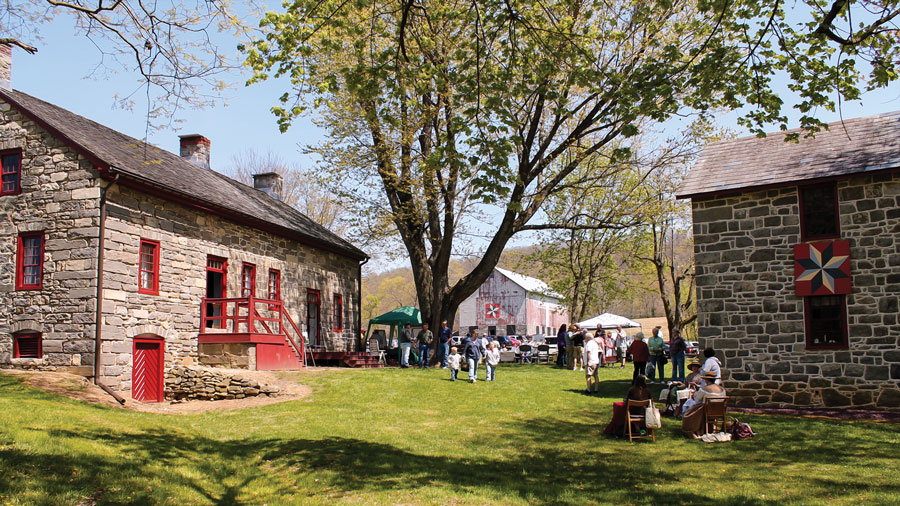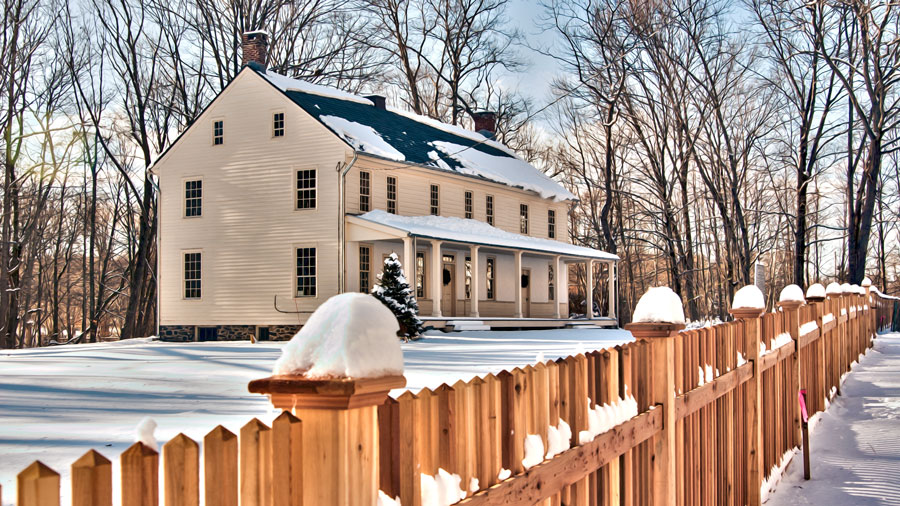Warren County is home for some of the most spectacular views, cleanest waterways and richest farmland in New Jersey. The county also proudly displays a remarkable history from the eighteenth and nineteenth centuries that stems from wilderness times and rural American heritage. The historic Van Nest-Hoff-Vannatta Farmstead in Harmony Township illustrates much of that heritage, and hosts activities for the entire family.

The Van Nest-Hoff-Vannatta Farmstead reflects three centuries of agricultural practices and rural architecture. At its center is the farmhouse, originally built circa 1755, with an addition extending the house eastward, circa 1810. An amazing little building, referred to as the summer kitchen, sits in the southern yard of the farmhouse. It was built about the same time as the 1810 addition to the house and has a large fireplace where open hearth cooking is demonstrated. An outhouse and smokehouse sit just to the east of the farmhouse. Three wagon houses, built and altered throughout the nineteenth and twentieth centuries, line the gravel drive leading to the massive barn, built circa 1824. A remarkable structure, unlike any other known to exist, the barn’s heavy timber frame is a unique hybrid of building styles with an integral timber hay chute and a central swing post shaped like a turned column painted blood red.
The farmstead remained prosperous from its original settlement prior to the Revolutionary War, well into the twentieth century, gaining state recognition for its quality resources and production. However, as the twenty-first century approached, the farm declined, as changing agricultural practices and markets hampered its economic viability, and New Jersey’s Department of Environmental Protection purchased the property in the year 2000. The Township of Harmony, through its Historic Preservation Commission, swiftly stepped in to act as the steward of the seven acres containing the farm’s buildings, which were threatened by demolition. By 2005 the site was listed on the National Register of Historic Places, and preservation efforts were well underway. In 2013, the Farmstead received a New Jersey State Historic Preservation Award that recognized the work of the Harmony Township Historical Society, and the officially recognized “Friends Organization” that formed a base for fundraising and volunteers. The other key partner in the historic farmstead’s salvation was Warren County’s Municipal and Charitable Conservancy Trust Fund program.
Financed by a portion of Warren County’s Open Space property assessment, the Municipal and Charitable Conservancy Trust Fund (MCCTF) is the county’s principal granting mechanism for non-profit and municipal sponsored open space and historic preservation projects. Each year, a twelve-member committee reviews grant proposals, then prioritizes and makes recommendations to the Board of Chosen Freeholders for the funding of recreation, farmland, and historic preservation projects. Since 1997, 136 applications have been approved, granting $23,140,826 to cover 44.5% of project costs totaling $51,996,570.
“The MCCTF Historic Preservation and Open Space grants administered by the committee help counter the sobering reality that New Jersey loses nearly fifty acres of open space and untold historic resources every day,” says Hal Bromm, a committee veteran. “Projects embodying a true sense of place—cultural or physical landscapes and structures that reflect a bygone snapshot in time—allow visitors to experience how local history shaped the communities we know today.”
Bromm also chairs the Knowlton Township Historic Commission, which has concentrated efforts at the Ramsaysburg Historic Homestead on twelve acres along the Delaware River. Other MCCTF grantees that have showcased their improvements on Preservation Day include Rutherfurd Hall, where visitors explored the early twentieth century estate and grand Tudor mansion, now a cultural center and museum in Allamuchy. Before that, Hardwick’s idyllic White Lake, and the beautifully restored 200-year-old Vass House, headquarters to another farm full of history, accommodated crowds of eager outdoor enthusiasts and heritage devotees.

At the historic Asbury Grist Mill, where the MCCTF has assisted in the first phases of restoration, the mill will eventually serve as an educational facility and contain exhibit space for early mill and agricultural technology. In Phillipsburg, the Fund has assisted in the ongoing restoration of the Roseberry Homestead, an eighteenth century manor on the National Register of Historic Places. Other notable beneficiaries have included historic churches, railroad stations, and libraries. Beyond those structural repairs, the MCCTF has had a hand in the preservation of more than 5,213 acres in open space.
“With sustained support from the County Freeholders and municipal leaders, local groups have been able to bring many of these unique sites back from the brink of disaster,” says Corey Tierney, Director of Warren County’s Department of Land Preservation. “We are proud to be a funding partner on so many important historic preservation projects throughout the county, but the restoration of these marvelous sites wouldn’t have been possible without enduring community support. Behind nearly every successful project, there’s a group of local individuals whose enthusiasm and commitment are really the driving force. It has taken years, sometimes decades, to restore many of these buildings. But these remarkable people remain committed to their cause. They volunteer their time, they conduct the research, they share a site’s history with others, they apply for grants, they oversee the various craftsmen, and much more. What’s most inspiring though, is that they do all of this in a way that not only enriches Warren County’s historic landscape, but they do it in a way that brings our entire community together.”
Thanks to Michael J. Margulies, RA, AIA, project architect at the Van Nest-Hoff-Vannatta Farmstead. For more information on the Farmstead, visit the website.
For more information on Warren County open space projects, click or call 908-453-3252.
Local roots!
The 8,461 acre park includes the 2500-acre Deer Lake Park, Waterloo Village, mountain bike and horseback trails.
The Centenary Stage Company produces professional equity theatre and also a wide variety of top-flight musical and dance events throughout the year.
Choose and Cut from 10,000 trees! Blue Spruce, Norway Spruce, White Pine, Scotch Pine Fraser Fir, Canaan fir, Douglas Fir. Family run on preserved farmland. Open Nov 29 - Dec 23, Tues-Sunday, 9-4. Easy Access from Routes 78 or 80.
Consider Rutherfurd Hall as refuge and sanctuary in similar ways now, as it served a distinguished family a hundred years ago.